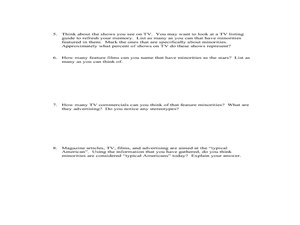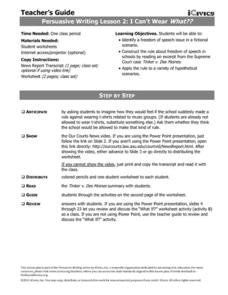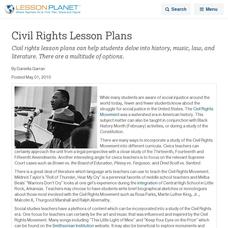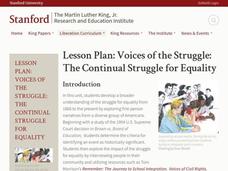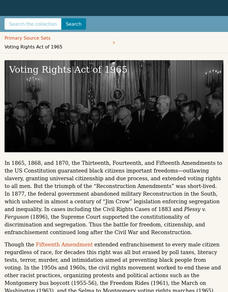Heritage Foundation
Procedural Rights: Amendments VI, VII, and VIII
Even in court, your class members have procedural rights provided by the amendments. Teach high schoolers this important lesson by using the 18th installment of a 20-part unit exploring the US Constitution. The resource provides several...
Judicial Learning Center
Your Day in Court
Whether out of choice or necessity, people want to know what will happen on a typical day in court. A helpful lesson walks scholars in the field of criminology through the trial process from opening statements to the final verdict.
Tolerance
A Time for Justice
The Academy Award-winning documentary A Time for Justice launches a unit that examines America's civil rights movement. Class members examine key events and participants in the movement and consider how the civil rights movement...
Curated OER
Minorities in Mainstream American Society
So many people fought for Civil Rights in the United States. Read about the Civil Rights Act of 1964, and discuss what the act guarantees. Then pass out a slew of magazines and encourage them to observe how often minorities appear in...
Judicial Learning Center
Levels of the Federal Courts
The Supreme Court gets all the glory, but very few federal cases make it to the highest court. An interesting lesson explores the structure of the lower levels of the federal court system. In addition to outlining the organization of...
iCivics
I Can’t Wear What?
Can schools ban t-shirts picturing musical groups or bands? Your young citizens will find out with this resource, which includes a summary of a United States Supreme Court case from the 1960s about a similar dispute over students wearing...
K20 LEARN
Bill of Rights: Do I Have a Right?
Aliens have taken over the United States! Citizens can only keep two rights laid out in the first 10 amendments of the Constitution and must figure out which ones are best. Young scholars research the importance of each amendment and key...
Curated OER
Civil Rights Lesson Plans
Civil rights lesson plans can help students delve into history, music, law, and literature. There are a multitude of options.
Curated OER
Should Homosexuals Have the Right to Laws Protecting Them From Discrimination?
Students explore discrimination issues in America. In this homosexual rights lesson, students listen to their instructor lecture on antidiscrimination laws and gay rights. Students respond to questions about the Romer v. Evans case.
Curated OER
Unsung Heroes of the Civil Rights Movement
Students analyze historic rulings that played roles in the Civil Rights Movement. In this civil right lesson, students research Internet and print sources regarding Plessy v. Ferguson, Sipuel v. Board of Regents of the University of...
School Improvement in Maryland
Court Proceedings Civil Cases
What's the difference between civil and criminal law? How do the court proceedings differ in these two types of trials? How do the standards of proof differ? Why do these differences exist? As part of their examination of the...
Teaching for Change
A Documents-Based Lesson on the Voting Rights Act
How did the Voting Rights Act affect the daily lives of American citizens? A document-based lesson developed by the Student Non-Violent Coordinating committee (SNCC) presents a case study of the impact of the Voting Rights Act of 1965 on...
Stanford University
Voices of the Struggle: The Continual Struggle for Equality
As part of a study of the Civil Rights Movement from 1868 to the present, class members examine first person narratives, the Supreme Court case Brown v. Board of Education, and other significant events in civil rights history....
Teaching Tolerance
Using Photographs to Teach Social Justice | Legal Action: The Supreme Court
A social justice lesson focuses on the Supreme Court case Loving v. Virginia which struck down laws that prohibited marriages between African Americans and white Americans. The lesson begins with class members examining a photograph of...
Curated OER
Civil Rights and the Michigan Supreme Court II
Students view a PowerPoint presentation on the Michigan Supreme Court Historical Society's Civil Rights and/or the Native American Rights. They write a reaction paper and prepare for a class discussion. They work in groups and discuss...
Curated OER
Chapter 23 – The Civil Rights Movement
For this U.S. history worksheet, students read assigned textbook pages on the Civil Rights Movement and respond to 48 short answer questions.
Judicial Learning Center
The Appeal Process
Why doesn't the Supreme Court hear testimony from witnesses? How do they complete an entire proceeding in less than two hours? A helpful lesson guides scholars of criminology through these and other questions by explaining how appeals...
Curated OER
Supreme Court Decisions and Their Effect On Us
Consider five Supreme Court cases and how their outcomes have directly affected the American population. Government students research and compose a 1-2 page pager outlining the examples of our daily life that have specifically been...
Judicial Learning Center
Getting Ready for Trial
A courtroom can be a scary place for the uninitiated. Get familiar with the process using a helpful overview of the activities that take place prior to both civil and criminal cases. The lesson explains the differences between...
National First Ladies' Library
Safety or Civil Liberty? The Trial of Sacco and Vanzet
Students investigate the Sacco-Vanzetti trial and develop a basic understanding of the issues involved. Then they write an essay taking a stance on the Sacco-Vanzetti trial: was the trial fair? were the two men falsely accused? Finally,...
Curated OER
Individual Rights at School
Young scholars understand that disputes over law and individual rights touch all phases of daily life, even athletic and recreational activities
Digital Public Library of America
Voting Rights Act of 1965
Despite the passing of the Thirteenth, Fourteenth, and Fifteenth Amendments, as well as the passing of the Voting Rights Act of 1965, the struggle to ensure fair voter registration and election procedures continues. Young historians...
Curated OER
The Right to Remain Resilient
Students examine the Civil Rights Movements in the U.S., both current and historic. In small groups students investigate a specific civil rights group, create an illustrated timeline, noting key events, people, and state and federal laws.
New York State Education Department
US History and Government Examination: January 2011
The presidencies of John F. Kennedy, Richard Nixon, and Ronald Reagan were defined by the Cold War. Using primary source documents and scaffolded analysis questions, pupils explore the effect the Cold War had on these presidencies. A...





